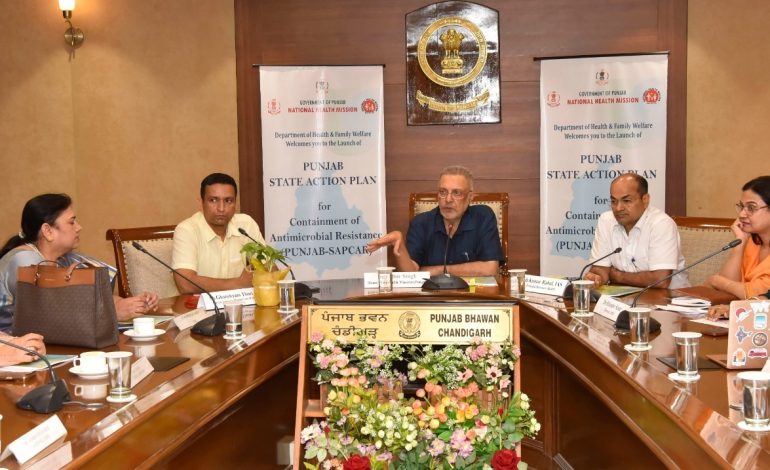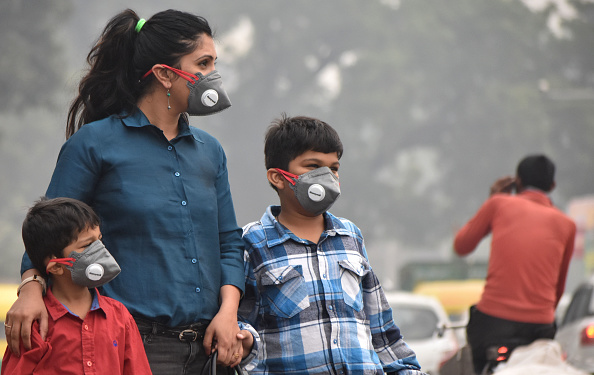Punjab Launches Action Plan Against Antimicrobial Resistance (AMR)

Introduction
In a significant step toward strengthening public health and tackling one of the world’s most pressing medical challenges, Punjab has officially launched its State Action Plan to combat Antimicrobial Resistance (AMR). With this move, Punjab becomes the seventh Indian state to adopt a structured strategy to curb the misuse of antibiotics and promote responsible medical practices.
The initiative aligns with India’s National Action Plan on AMR (NAP-AMR) and the World Health Organization’s Global Action Plan (GAP), emphasizing the need for coordinated efforts among healthcare professionals, policymakers, veterinarians, and the public to prevent the spread of drug-resistant infections.
What is Antimicrobial Resistance (AMR)?
Antimicrobial Resistance (AMR) occurs when bacteria, viruses, fungi, and parasites evolve to resist the effects of medicines that once killed them. This makes common infections harder — and sometimes impossible — to treat.
Globally, AMR is recognized as a silent pandemic, responsible for an estimated 5 million deaths annually. In India, the issue is particularly concerning due to high antibiotic consumption, self-medication, and limited regulation in animal husbandry and food production sectors.
Punjab’s Strategy to Tackle AMR
The Punjab State Action Plan on AMR (SAP-AMR) has been designed in collaboration with the World Health Organization (WHO) and India’s Ministry of Health and Family Welfare (MoHFW). It focuses on a multi-sectoral “One Health” approach, acknowledging that human, animal, and environmental health are interconnected.
Key components of Punjab’s AMR Action Plan include:
Surveillance and Research
The state aims to strengthen laboratory networks and data collection systems for tracking AMR trends across hospitals, clinics, and veterinary facilities. This will help detect resistance patterns early and guide evidence-based treatment protocols.
Rational Use of Antibiotics
Punjab’s health department will enforce antibiotic stewardship programs (ASPs) in both public and private healthcare facilities. These programs educate doctors and pharmacists on appropriate prescribing practices and discourage the overuse of broad-spectrum antibiotics.
Public Awareness Campaigns
Widespread campaigns will be launched to educate citizens about the dangers of antibiotic misuse and the importance of completing prescribed courses. Schools, universities, and rural communities will be key targets of this initiative.
Regulation in Animal and Food Sectors
Since antibiotics are often misused in livestock and poultry farming, the plan mandates monitoring of antibiotic use in animal feed and veterinary prescriptions. This step is crucial to prevent resistant bacteria from entering the food chain.
Infection Prevention and Control (IPC)
Hospitals will strengthen their hygiene and sanitation measures to minimize infection spread. Healthcare workers will receive training in infection control protocols, including hand hygiene, waste management, and isolation procedures for patients with resistant infections.
Capacity Building and Collaboration
The Punjab AMR plan emphasizes inter-departmental coordination, involving not just health, but also agriculture, animal husbandry, and environment departments. Continuous training programs and knowledge-sharing platforms will support this ecosystem.
Why This Step Matters
Punjab’s launch of its AMR plan is not just a regional milestone — it’s a critical addition to India’s national public health framework. The state’s proactive stance will likely set a benchmark for others still developing their AMR strategies.
India’s growing burden of drug-resistant infections — such as tuberculosis (TB), urinary tract infections (UTIs), and hospital-acquired infections — underscores the urgency of these interventions. By tackling AMR now, Punjab is helping prevent a future where even minor infections become life-threatening.
Challenges Ahead
While the plan is comprehensive, its success depends on implementation. Ensuring compliance across rural healthcare centers, controlling over-the-counter antibiotic sales, and maintaining coordination between departments are expected to be major challenges.
Moreover, public participation will be key. Without behavioral change — among patients, doctors, and farmers — even the best policies risk falling short.
Conclusion
Punjab’s State Action Plan on Antimicrobial Resistance represents a vital step forward in India’s battle against antibiotic misuse and drug resistance. By focusing on education, regulation, and innovation, the initiative aims to protect the effectiveness of life-saving medicines for future generations.
As one of the first few states to adopt this framework, Punjab has set a strong example for the rest of the country — showing that collective responsibility and informed action can fight even the most silent threats to public health.









